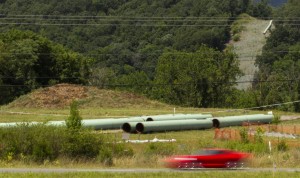
The MVP right of way and piping are visible beside Rt. 460, July 16, 2023, in Elliston, VA. (Scott P. Yates for Virginia Mercury)
.
.
From an Article by Charlie Paullin, Virginia Mercury, July 27, 2023
.
.
Work on the Mountain Valley Pipeline project is allowed to continue after U.S. Supreme Court Chief Justice John Roberts on Thursday lifted two stays, or pauses, imposed by a lower court in response to challenges from environmental groups. Roberts order was handed down as the 4th Circuit was hearing arguments on the stays!
The lifting of the stays was issued while the Richmond-based U.S. 4th Circuit Court of Appeals was hearing oral arguments on whether provisions of the federal Fiscal Responsibility Act ordering the pipeline’s completion were constitutional.
Mountain Valley Pipeline, which got initial approval from the Federal Energy Regulatory Commission in 2017, has been embroiled for years in legal challenges from environmental groups like the Sierra Club, Wilderness Society and Appalachian Voices over issues including impacts to endangered species and waterways.
The over 300-mile project is intended to deliver natural gas from the Marcellus and Utica shale fields through West Virginia to southern Virginia. The legal challenges have stymied completion of the project, which the company says is 94% done. Environmental groups dispute that figure.
The U.S. 4th Circuit Court of Appeals has consistently overturned permits issued to Mountain Valley Pipeline by the federal government over threats to wildlife and erosion and sediment harms.
But in June, Congress passed the Fiscal Responsibility Act with a provision, introduced by West Virginia Sen. Joe Manchin, that directed federal agencies to approve the pipeline’s permits within 21 days. The law also stripped jurisdictional authority from the U.S. 4th Circuit Court of Appeals and transferred any legal challenges to the D.C. Circuit.
Following passage of the FRA, Mountain Valley filed a motion to dismiss the legal challenges pending in the 4th Circuit, citing the authority given in the federal law. Numerous environmental groups then challenged the motion to dismiss, arguing the provision in the Fiscal Responsibility Act was unconstitutional because its stripping of authority from the courts breached the principle of the separation of powers of government.
On Thursday, MVP attorney Donald B. Verrilli, Jr. argued before a three-judge panel on the 4th Circuit that precedent set in Klein v. United States allowed Congress to alter a court’s jurisdictional authority if there is a substantive change in the law.
Verrilli argued that the Fiscal Responsibility Act provision granting Mountain Valley the permits irrespective of current law was such a substantive change. “It said it is approved,” Verrilli said.
But the environmental groups argued that Klein found that Congress cannot dictate the winner of court cases. “There has to be a line, and, respectfully, that line has been crossed,” said Kym Meyer, litigation director at the Southern Environmental Law Center.
The judges, Roger L. Gregory, James Andrew Wynn and Stephanie D. Thacker, questioned attorneys about where the line delineating the court’s authority should be drawn, noting that after the pipeline is complete, there could be future challenges against the project that arise.
“We have to know when we can be judges again,” said Gregory.
The three judges will now decide whether to issue an order to dismiss the case or not. Before adjourning from the courtroom Thursday, Wynn acknowledged that the gathering of court officials and attorneys, who have been arguing the case for years, may have happened for the last time.
